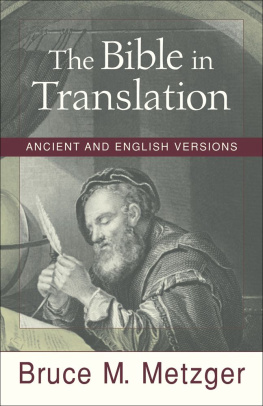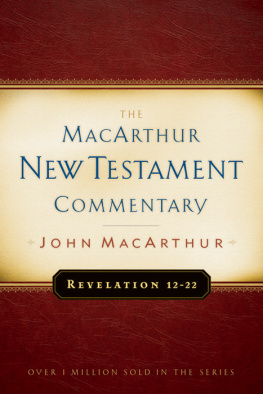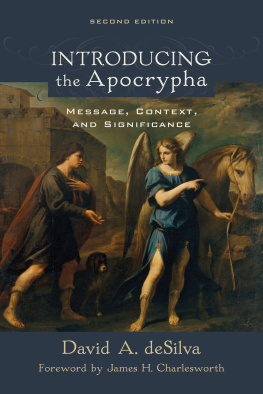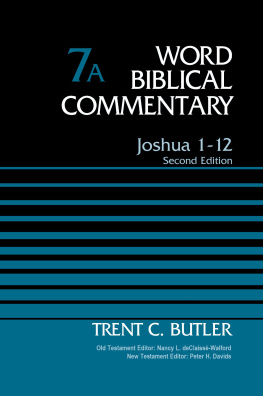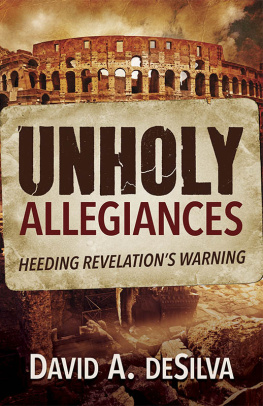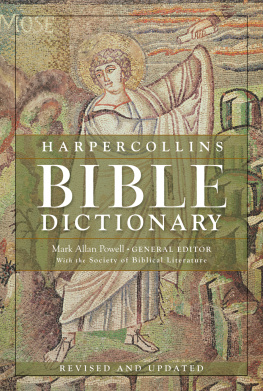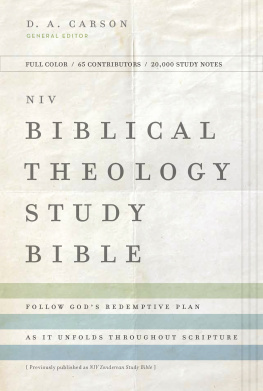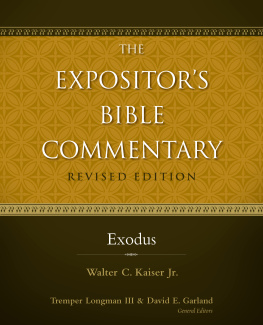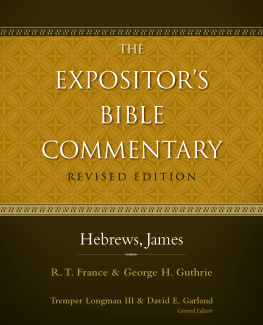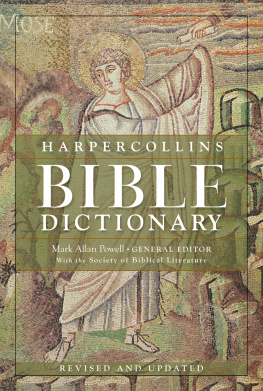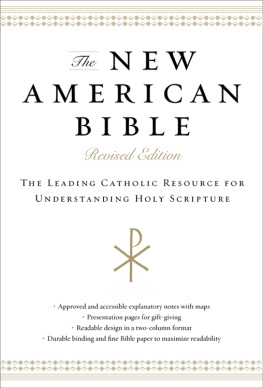BREAKING THE CODE
BREAKING THE CODE REVISED EDITION:
UNDERSTANDING THE BOOK OF REVELATION
Breaking the Code Revised Edition
978-1-5018-8150-3
978-1-5018-8151-0 eBook
Breaking the Code: DVD
978-1-5018-8154-1
Breaking the Code: Leader Guide
978-1-5018-8152-7
978-1-5018-8153-4 eBook
For more information, visit www.abingdonpress.com.
BRUCE M. METZGER
REVISED AND UPDATED BY DAVID A. DESILVA
BREAKING
THE
CODE
UNDERSTANDING THE BOOK OF
REVELATION

BREAKING THE CODE REVISED EDITION
Understanding the Book of Revelation
Copyright 1993, 2019 by Abingdon Press
All rights reserved.
No part of this work may be reproduced or transmitted in any form or by any means, electronic or mechanical, including photocopying and recording, or by any information storage or retrieval system, except as may be expressly permitted by the 1976 Copyright Act or in writing from the publisher. Requests for permission can be addressed to Permissions, The United Methodist Publishing House, 2222 Rosa L. Parks Blvd., Nashville, TN 37228-1306 or e-mailed to .
Library of Congress Cataloging-in-Publication data has been requested.
ISBN 978-1-5018-8150-3
Unless noted otherwise, Scripture quotations are from New Revised Standard Version Bible, copyright 1989 National Council of the Churches of Christ in the United States of America. Used by permission. All rights reserved worldwide. http://nrsvbibles.org/
Scripture quotations noted RSV are from Revised Standard Version of the Bible, copyright 1946, 1952, and 1971 National Council of the Churches of Christ in the United States of America. Used by permission. All rights reserved worldwide. http://nrsvbibles.org/
Scripture quotations noted Apocrypha are from Revised Standard Version of the Bible, Apocrypha, copyright 1957; The Third and Fourth Books of the Maccabees and Psalm 151, copyright 1977 National Council of the Churches of Christ in the United States of America. Used by permission. All rights reserved worldwide. http://nrsvbibles.org/
19 20 21 22 23 24 25 26 27 28 10 9 8 7 6 5 4 3 2 1
MANUFACTURED IN THE UNITED STATES OF AMERICA
In memory of Isobel Mackay Metzger
(19182016)
CONTENTS
PREFACE TO THE REVISED EDITION
The book that closes our New Testament canon is not itself a closed book. When John sent it to his congregations in first-century Roman Asia, it was his hope that Revelation would illumine their world, would help them see its landscape and its challenges more clearly in the light of the whole witness of Scripture and in the light of Gods unique and fundamental claim upon the allegiance and obedience of all who live and move and have being. Revelation is not meant to be a book that obscures our sight, but one that lifts the veil from all that obscures the spiritual significance ofand the spiritual dangers inthe choices that we make and the entanglements we must navigate on a daily basis.
It has been twenty-five years since Professor Metzger wrote his reliable guide to listening to Revelations message, and his volume has contributed a great deal to mainline Christians renewed engagement with this often off-putting conclusion to our canon. I was raised Episcopalian and eventually ordained United Methodist, denominations in which one is likely to hear readings from Revelation only on All Saints Day and possibly at funerals. I share Professor Metzgers desire to see more Christians from such traditions allow Revelation to exercise its full, formative impact on them and their vision for discipleship. It was a privilege, therefore, to have been invited to revise and update Professor Metzgers work and to add something from the fruits of my own career-long study of Revelation to what he has offered.
A number of advances have been made in our understanding of Revelation since Professor Metzger completed his work. We have learned more about the dynamics of the cult of the Roman emperors and about what motivated and what was at stake for a city in worshiping a political ruler as a divine benefactor. We have become more sensitive to the deleterious effects of imperialism and colonialism and, as a consequence, have seen a new dimension in Revelation as an example of resistance literature. We have reflected more on the public ideologythe propagandaof Roman rule, and as a result we have seen how Revelation is a far more politically charged text than readers might once have suspected. We have explored more fully what apocalypses are and how they work to change the perceptions and motivations of their audiences. All of these advances have also helped pastor-theologians perceive new dimensions in how Revelations word challenges us to keep the commandments of God and hold the testimony of Jesus (12:17) across a broader spectrum of our life experiences. It is my hope that this revised and updated version of Professor Metzgers work benefits from these advances without losing any of his essential insights into the book and into our engagement with the world as faithful disciples.
While individual study will always be rewarding, Revelation is a text that is perhaps best heard and studied in community. It was written and first read to gathered assemblies in the context of worship and prayer; its word was conceived of as what the Spirit is saying to the churches, and not to lone disciples. Its challenge is most fully and readily met by groups of disciples working together to discover and embody its word, and its ultimate goal is to call into being a new way of being human together before God. I would encourage you, if at all possible, to seek out other Christ-followers from your church, family, or circles to engage this study together.
David A. deSilva
Ashland Theological Seminary
Ashland, Ohio
PREFACE TO THE FIRST EDITION
For most church members, the Book of Revelation is a closed book. They avoid it, thinking it too mysterious for them to understand. On the other hand, a few people seem to live in the Book of Revelation, concentrating all their reading of Scripture on this one book alone. Both of these extremes are shortsighted and ill-advised.
The Book of Revelation contains passages of great beauty and comfort that have sustained Christian believers over the ages. Doubtless there are parts that seem to the casual reader to be bizarre and bewildering. But when one approaches the book recognizing that it belongs to a special type of literature (the apocalyptic type), then one can begin to appreciate the overall message of John, the theologian of Patmos. Of course, some parts will remain enigmatic, but on the whole the attentive reader will be surprised to find how much of the book makes sense.
For a good many years the present writer has had an academic as well as a personal interest in the Book of Revelation. The task of giving lectures on Revelation to theological students as well as presenting Bible studies of this book to church people in various congregations has required both a scholarly and a devotional consideration of this remarkable book.
The approach of the present volume has in mind the needs and interests of the general nontheological reader. Special attention is directed to the literary form and the spiritual message of Revelation. Endnotes are kept to a minimum, and the application is more than once directed to present-day realities of the Christian life.
Quotations of Scripture are made from the New Revised Standard Version of the Bible. In the exposition of the text occasional phrases have been adapted from the present writers comments on Revelation in
Next page

